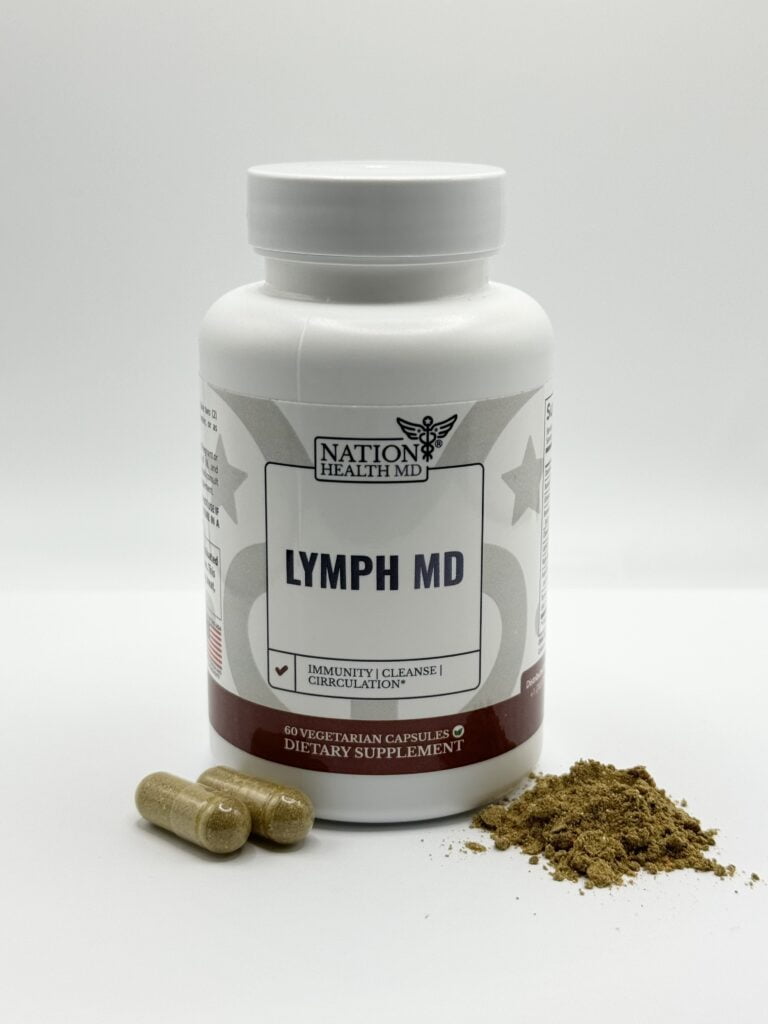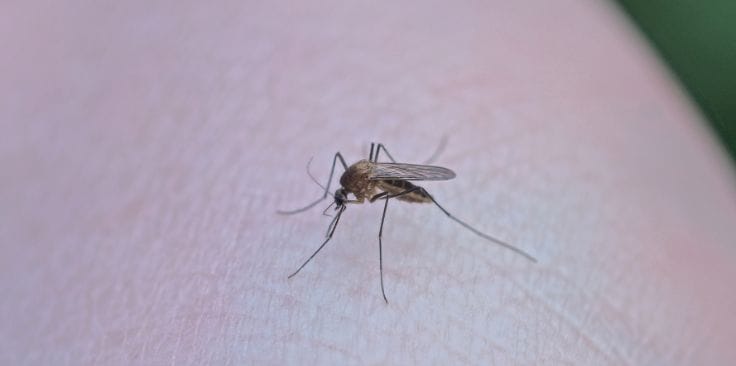How To Boost Your Lymphatic System
Medically reviewed by our experts


Learning how to improve lymphatic system function is key to supporting your overall health and wellness. The lymphatic system is an important part of your immune and circulatory systems. It helps remove waste and balance fluids in your body. When it’s working well, it can promote energy, resilience, and a healthy balance.
Many find that natural support methods – like good nutrition, gentle movement, and simple lifestyle habits – help maintain lymphatic health. In this guide, we’ll explore easy ways to support your lymphatic system and help you add these effective habits into your daily routine.
Understanding Your Lymphatic System
The lymphatic system is a network of vessels, nodes, and tissues that keeps your body balanced and protected. It acts like an internal drainage system, moving a clear fluid called lymph, which clears away waste, toxins, and extra fluids from tissues.
Lymph flows through lymph nodes, where the body traps and processes harmful substances. This system also supports your immunity by transporting white blood cells that help defend against infections. The lymphatic system helps keep fluid balance and supports immune health. It is important for overall wellness and body function.
If you want to keep your lymphatic system healthy, try Lymph MD from Nation Health MD. It has a mix of strong, natural ingredients that help your lymphatic system work well. Endorsed by Lisa King, RPh, this supplement includes ingredients such as Dandelion Extract, Echinacea Purpurea Extract, and Cleavers Extract.
Dandelion extract supports fluid balance, while echinacea purpurea contributes to immune resilience. Cleavers extract further aids in detoxification within the lymphatic network, helping to reduce swelling and discomfort. These natural ingredients work together to help the lymphatic system cleanse and detoxify. This can make you feel lighter, healthier, and more energized each day.
Nutritional Support

Learning how to improve lymphatic system health starts with making the right food choices. Some foods can actively support lymphatic function, aiding detoxification, fluid balance, and immune health.
Leafy greens, berries, and certain herbs are very helpful. They give us antioxidants, vitamins, and minerals. These nutrients boost lymph flow and help remove toxins from the body.
Leafy greens like kale, spinach, and arugula are high in chlorophyll, which supports detoxification and healthy lymph flow. They’re also rich in vitamins A, C, and K, essential for cell health and immunity.
Berries like blueberries, raspberries, and strawberries are full of antioxidants. These antioxidants help protect lymphatic vessels from oxidative stress. They also promote smooth movement of lymph fluid.
To help the lymphatic system, it’s best to minimize certain foods:
- Processed sugars – Excess sugar can cause inflammation, slowing lymph circulation.
- High salt intake – Too much salt can lead to fluid retention, stressing the lymphatic system.
- Unhealthy fats – Processed fats in fried and packaged foods may clog lymph pathways, making detoxification harder.
Practical alternatives include:
- Swapping sugary snacks for a handful of fresh berries or a smoothie with leafy greens
- Choosing healthy fats like avocados, nuts, and seeds instead of processed foods
- Replacing processed meats with lean proteins like chicken, fish, or legumes
These healthy options support your lymph system. You can easily add them to your routine. They help improve lymphatic function and overall wellness naturally.
Movement for Lymphatic Health
Regular movement is essential for lymph support. The lymphatic system works differently from the cardiovascular system. It needs physical activity to move lymph fluid.
This fluid helps remove waste and toxins from the body. Simple, gentle exercises can be highly effective in promoting lymph flow:
- Rebounding – Bounce on a mini-trampoline for 5-10 minutes daily to stimulate lymph flow with the help of gravity.
- Walking – Take a 30-minute walk each day to encourage natural lymph movement through muscle contraction.
- Gentle stretching – Focus on stretches that open the chest and abdomen to promote lymph circulation.
- Yoga – Do poses that involve twisting and lifting your legs, like twists and legs-up-the-wall. Practice for 10-15 minutes to help with lymphatic drainage.
To make these exercises a habit, start small with short, manageable sessions and aim for consistency over perfection. Incorporate movement into your daily routine by walking after meals or stretching in the morning and evening. By making the routine fun and flexible, you will find it easier to follow. This will help your lymphatic health.
Hydration and Fluid Balance

Staying hydrated is essential for healthy lymphatic function, as lymph fluid is primarily made up of water. Without enough water, lymph flow can slow down, leading to inefficient waste removal. Aim for at least 8-10 glasses of water daily, adjusting based on your activity level and climate.
Spread your water intake throughout the day to maintain consistent hydration. Drinking a glass of water when you wake up and before meals can also support fluid balance. Signs of proper hydration include clear or light-yellow urine and consistent energy levels. Staying well-hydrated supports lymphatic health and overall wellness.
Lifestyle Support Methods
If you want to improve your lymphatic system health, try deep breathing techniques. You can also change your environment.
- Diaphragmatic Breathing – Practice deep belly breathing for 5-10 minutes each morning and evening to promote lymph flow.
- Dry Brushing – Gently brush your skin in upward strokes toward the heart for a few minutes before your shower to stimulate lymph drainage.
- Hydrate Regularly – Drink 8-10 glasses of water daily to keep lymph fluid moving smoothly.
- Stretching/Yoga – Do gentle stretching or yoga poses, like twists and leg lifts, for 10-15 minutes each day. This helps move lymph fluid.
To make these habits stick, start small and incorporate them into your daily routine. Set reminders, keep a water bottle nearby, or add a few minutes of breathing or brushing before your shower. By making these practices part of your routine, they’ll feel natural and sustainable.
Daily Lymphatic Support Routine
A healthy lymphatic system can be supported with a simple, daily routine that fits into your schedule. Here’s an outline:
- Morning – Start your day with 5-10 minutes of deep diaphragmatic breathing to stimulate lymph flow. Follow this with dry brushing before your shower, using gentle, upward strokes toward the heart. Drink a glass of water upon waking to kick-start hydration.
- Afternoon – Take a brisk 30-minute walk or engage in light stretching to keep lymph fluid moving. Swap sugary snacks for fresh berries or a green smoothie to nourish your lymphatic system.
- Evening – Relax with some deep breathing or a gentle yoga routine. Focus on twists and leg lifts. Drink another glass of water before bed to maintain fluid balance.
This daily routine is adaptable and incorporates small actions throughout the day, helping support your lymphatic system without major lifestyle changes.
Conclusion
Understanding how to improve lymphatic system health can help you feel more balanced and energized. You can naturally support your body’s detox process by incorporating simple habits like drinking more water, moving your body, and practicing mindful breathing. Start small, stay consistent, and take the first step toward a healthier, more resilient you.
You can support your lymphatic system naturally by staying hydrated, engaging in regular physical activity, and incorporating lymphatic-supportive herbs such as dandelion and ginger into your diet. These practices can stimulate lymph flow and promote overall wellness.
Leafy greens, citrus fruits, and herbs like ginger and turmeric can promote lymphatic health. These foods provide essential nutrients that support the body’s natural cleansing processes, which are crucial for a balanced lymphatic system.
Physical activity, particularly activities like yoga and rebounding, can stimulate lymphatic flow and support circulation. Regular exercise encourages the body’s natural filtration processes, promoting optimal lymphatic function and enhancing overall vitality.
Professional, C. C. M. (2024). Lymphatic system. Cleveland Clinic.
Clare, B. A., et al. (2009). The Diuretic Effect in Human Subjects of an Extract ofTaraxacum officinaleFolium over a Single Day. The Journal of Alternative and Complementary Medicine, 15(8), 929–934.
Ahmadi, F., et al. (2024). Echinacea: Bioactive Compounds and Agronomy. Plants, 13(9), 1235.
Cd-N, A. C. R. (2024). What are the benefits and side effects of cleavers? Verywell Health.
Martins, T., et al. (2023). Enhancing Health Benefits through Chlorophylls and Chlorophyll-Rich Agro-Food: A Comprehensive Review. Molecules, 28(14), 5344.
Ld, A. E. M. R. (2024). The 13 Healthiest Leafy Green Vegetables. Healthline.
Spritzler, F. (2019). 11 reasons why berries are among the healthiest foods on Earth. Healthline.
Harvard Health. (2022). The sweet danger of sugar.
Smith, J. (2024). Water Weight: What it is, causes, and how to lose it.
Smith, J. (2023). How do processed foods affect your health?
Li, Y., et al. (2023). Exercises in activating lymphatic system on fluid overload symptoms, abnormal weight gains, and physical functions among patients with heart failure: A randomized controlled trial. Frontiers in Cardiovascular Medicine, 10.
Moore, J. E., & Bertram, C. D. (2018). Lymphatic system flows. Annual Review of Fluid Mechanics, 50(1), 459–482.
Gordon, R. (2023). The benefits and risks of dry brushing. Healthline.
Popular Articles
Advertisement. This site offers health, wellness, fitness and nutritional information and is designed for educational purposes only. You should not rely on this information as a substitute for, nor does it replace, professional medical advice, diagnosis, or treatment. If you have any concerns or questions about your health, you should always consult with a physician or other health-care professional. Do not disregard, avoid or delay obtaining medical or health related advice from your health-care professional because of something you may have read on this site. The use of any information provided on this site is solely at your own risk.














